
Now that you have started collecting stamps, here are some important stamp words that you can learn. Then you can impress everyone with how much you know!!
Adhesive: the glue on the back of a stamp (there are different kinds)
Block: a set of stamps still attached to each other in the shape of a square or a rectangle (usually in a square of 4 stamps)
Booklet: a little book of stamps, the cover is usually cardboard
Cancellation (cancel): an ink mark made on a stamp to prove that it was paid for and has been used to mail an envelope or package
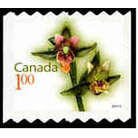
- Coil: stamps sold in rolls that only have perforations along the top and bottom, the sides of the stamps are straight and smooth (see picture at left)
Commemorative: a stamp that was made to celebrate something special. These stamps are sold for a limited time only.
Condition: a word to describe what kind of shape the stamp is in. It is important for the picture on a stamp to be well centered and have nice bright colors and no missing perforations. At Arpin Philately, we grade our stamps with the following expressions… - VF-Very Fine ……a perfect stamp, very well centered.
- F-Fine ……a stamp that is almost perfect, maybe it’s picture is off-center
- VG-Very Good ……a pretty stamp, but that is extremely off-center and maybe the colors are dull, if it has a cancellation, the ink might be very dark and hide the picture
- D-Defect …..a stamp with missing perforations
- SP-Space Filler ……a stamp that has a lot of tears, or maybe even a hole in it
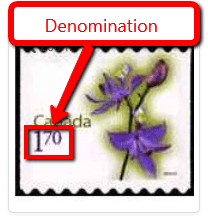
Definitive: an ordinary stamp that is sold over a long period of time, often it has the picture of a king or queen on it
Denomination: the little number on a stamp that says how much it cost to buy it (usually in one of the corners)
Die-cut: a stamp that doesn’t have to be separated by hand along its perforations, it has been pre-cut so that you just have to peel it off its backing paper. Sometimes the edges of a die-cut stamp are wavy to make the stamp look like it has real perforations.
Error: a really big mistake that has been printed on a stamp. Sometimes the picture is missing, or a color is missing, or the perforations are missing. Usually, there are very few stamps with the error.
Fake: a real stamp that has been changed to make it look like a different and usually, more expensive stamp. Sometimes people add colors or add to the picture on the stamp.
Forgery: a stamp that is not real and that was not made or printed by the post office. Dishonest people make these stamps themselves so that they can sell them and make money, but they are not genuine.
Gum (gummed): a type of adhesive (glue). Usually gummed stamps are water-activated, in other words, you have to lick them to get them to stick to the envelope.
Hinged: a stamp that used to have a little piece of paper attached to the back of it so that the collector could stick it in his album. Usually a hinge leaves a mark on the back of a stamp even when it is removed.
Imperforate: a stamp that has no wavy edges, all the edges are straight
Inscription: the words, letters and numbers on a stamps
Mint: a stamp that has never been used, or put on an envelope. It is in perfect condition with no marks on it.
Pair: a set of two stamps that are still attached together on one side by their perforations
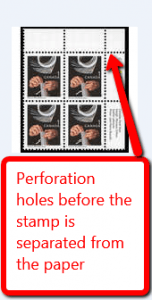
Perforations: when stamps are printed on large sheets of paper, holes are punched out along their edges so that you can separate them from one another. After you have separated your stamps, these holes leave a wavy edge all around the stamp (see picture at left).
Philately: the study of stamps and their history
Plate block: a block of four stamps still attached to one another, that was taken from the corner of a large stamp sheet. These blocks also have some selvage still attached.
Self-adhesive: stamps that are sold with the glue already on the back, they are like stickers.
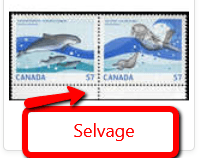
Selvage: the margin of paper that is left when you detach stamps from a sheet of stamps. Some people like to collect blocks that still have this paper attached on two sides.
Series: a set of stamps that were printed at the same time with a common theme (like flowers or animals)
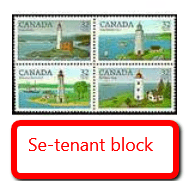
Se-tenant: stamps with a common theme that are still attached together by their perforations; they can come in a pair, blocks or strips
Souvenir sheet: a small, fancy, decorated sheet that has one or more stamps on it. It is a special kind of stamp sheet that some people like to collect
Tagging: some stamps have fluorescent ink marks printed on them, these ink marks are called tagging
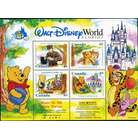
Unused: a stamp that was never used to mail an envelope and that doesn’t have a cancellation, but it is not perfect like a mint stamp. Maybe it has a hinge on it, or some of the gum is worn off.
Used: a stamp that has been used to mail an envelope and that has a cancel on it
Variety: a stamp that has a small mistake on it made during printing. Usually, many stamps can be found with the small mistake.
Vignette: the picture in the middle of a stamp
Watermark: a kind of mark embedded in the paper of a stamp that is invisible to the naked eye. It can only be seen by putting a special liquid on the stamp, or by shining a light through the back of the stamp.